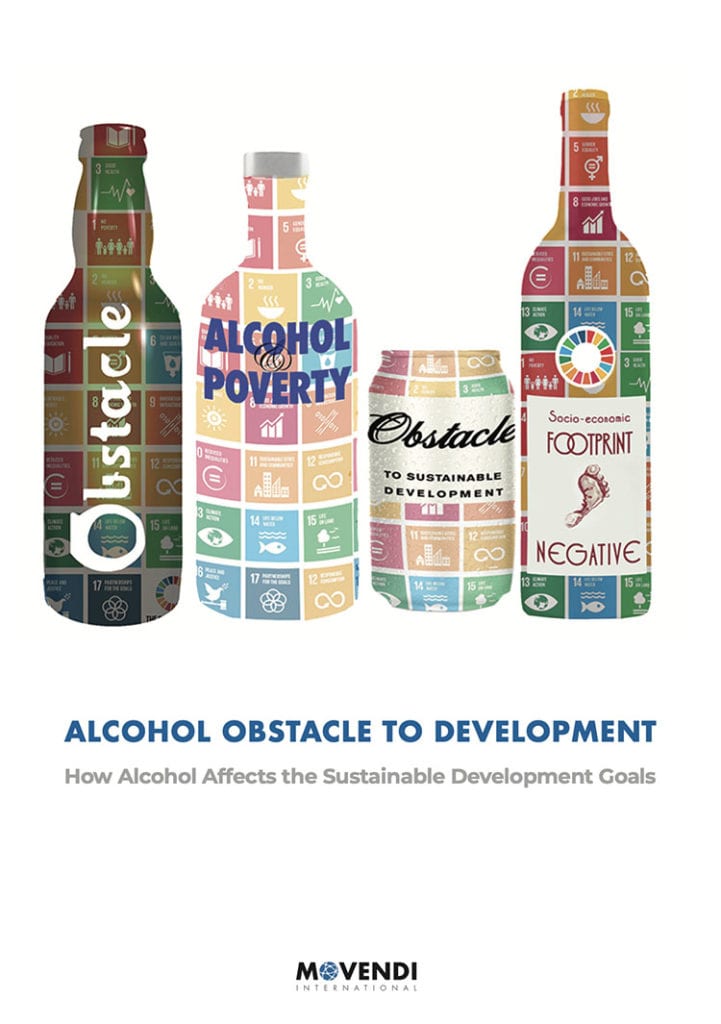Financing Development Report Omits Alcohol Taxation (Again)
The Financing for Sustainable Development report by the United Nations omits alcohol taxation again.
The report was published by the UN Inter-Agency Task Force for Financing Development. It discusses methods in which sustainable development can be financed and the resources necessary so that the world can achieve the Sustainable Development Goals (SDGs) by 2030.
In the last report published in 2019, alcohol taxation was not given the priority it should have had considering its substantive potential to generate revenue for development financing. In this year’s report alcohol taxation has been completely omitted from the report.
Alcohol is an obstacle to development
Alcohol is an obstacle to achieving 14 out of 17 Sustainable Development Goals (SDGs) and 54 of 169 targets. It is a major obstacle to sustainable human development.
Movendi International has published a report detailing state-of-the-art evidence on how alcohol hinders reaching the SDGs by 2030. Some basic facts from the book:
- Alcohol is jeopardizing human capital, undermining economic productivity, destroying the social fabric and burdening health systems.
- Alcohol kills 3 million people worldwide every year.
- That means: Every 10 seconds a human being dies because of alcohol.
- Worldwide, alcohol is responsible for 7.2% of all premature mortality.
- Alcohol harms young people disproportionately. Among people between the ages of 15 and 49, alcohol is in fact the number one risk factor for death and disability, accounting for 10% of all deaths in this age group.
Alcohol Taxation is a Key Tool to Finance Development
Alcohol taxation, when employed in an evidence-based manner, reaps positive effects for a number of Sustainable Development Goals according to the report on alcohol taxation published by Movendi International and the East African Alcohol Policy Alliance (EAAPA).
The report finds that 10 out of the 17 Sustainable Development Goals – such as eradication of poverty and hunger, gender equality, good health and well being, quality education, or economic growth – are positively impacted by alcohol taxation measures.
In fact, alcohol taxation is a key tool to tackle alcohol as obstacle to the SDGs.
Employing evidence-based alcohol taxation reaps significant benefits across (at least) 10 of 17 SDGs. There is strong evidence that raising alcohol taxes is an effective strategy for reducing alcohol consumption and related harms.
Alcohol taxation is a triple win measure:
- It reduces the burden of alcohol as obstacle to health and development for all.
- It helps raise domestic resources.
- It promotes health and development by making funds available to be invested in government programs, services and campaigns.
Alcohol taxation omission is a lost opportunity
The report contains two chapters that reasonably should include alcohol taxation, given the evidence-base for both alcohol as obstacle to development and alcohol taxation as catalyst for development.
Chapter III.A deals with “domestic public resources”, including domestic resource mobilization and illicit financial flows. Chapter III.C deals with “international development cooperation”, including trends in international development cooperation.
Even though United Nations Secretary General Guterres asserts in his forward that “Public health spending must increase…” the Financing Development Report 2020 omits alcohol taxation even in these key chapters where it was reasonable to expect the inclusion of alcohol taxation for development.
For instance, the chapter about domestic resource mobilization is a missed opportunity to direct the spotlight on the potential of alcohol taxation.
Raising taxes on alcohol to 40% of the retail price could have [a big] impact. Estimates for 12 low-income countries show that [alcohol] consumption levels would fall by more than 10%, while tax revenues would more than triple to a level amounting to 38% of total health spending in those countries. Even if only a portion of the proceeds were allocated to health, access to services would be greatly enhanced,” according to the World Health Report 2010.
A disproportionate share of the health and economic costs of alcohol falls on poorer households. But they are more responsive to increased prices than richer households. Therefore, alcohol taxes disproportionately benefit the poor through reducing alcohol use and related harm, such as having fewer sick days, longer and more productive working lives, and spending less on health care.
Increased resources from alcohol taxes can be invested in programs that favor the poor, in this way further strengthening the benefits.
- Increasing alcohol taxes will avert 9 (20% increase) to 22 (50% increase) million premature deaths over a 50 year period.
- Over 50 years, a tax that increases alcohol prices by 20% over current levels could generate almost US$9 trillion in additional revenues; for a 50% increase, the gain could be almost US$17 trillion in additional revenues.
Another example of a missed opportunity is the chapter about international development cooperation. Given the fact that in November 2019, Norway launched a new and ground-breaking international development strategy “Better Health, Better Lives” to tackle non-communicable diseases (NCDs) and the risk factors as part of its international development assistance. In doing so, Norway became the first country to launch a strategy aimed at tackling NCDs and their major risk factors, including alcohol as part of their international development assistance work.
Norwegian Minister of Health, Bent Høie, noted that the new strategy builds upon WHO’s normative work on NCDs, and particularly the 16 WHO-recommended “Best Buys” – interventions for the prevention and control of NCDs.
If these were implemented, over 8 million lives could be saved annually by 2030; there would also be a total savings of $US 7 trillion in low- and middle-income countries over the next 15 years,” he said, citing WHO data.
The 2020 Financing for Development Report should have included this new Norwegian strategy as example for how development assistance could be spent well to actually tackle the biggest obstacles to sustainable human development.
—
For further reading:
Download the complete report (PDF) here…
Download the report overview only (PDF) here…
Source Website: United Nations Inter-agency Task Force on Financing for Development
